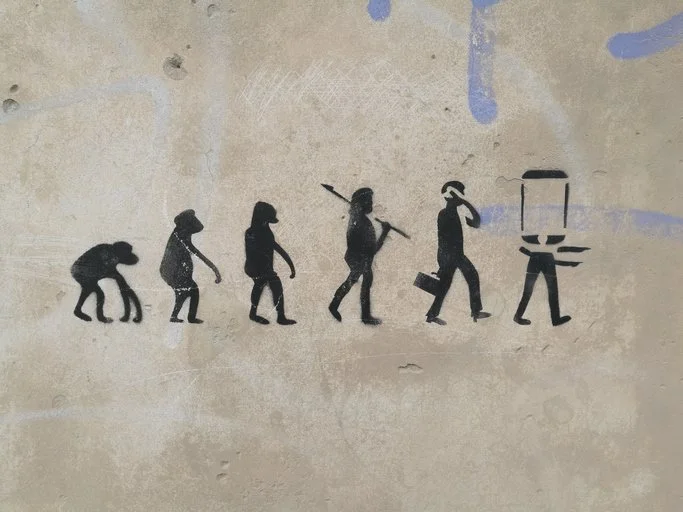The Incredible Human Part 2: Language, Writing, and Rapid Adaptation
In part one of this series, I spoke about how walking on two legs helped us grasp and throw. Although walking on two legs is not unique to humans, our dexterity and ability to throw gave us a considerable advantage in the survival game. Today, I will talk about our use of language and how it enables us to adapt to new environments at will.
Speech Leaves No Physical Trace
Since speech leaves no physical clues for archeologists to find, little is known regarding when and how we acquired it. Christine Kenneally explains the problem of exploring the advent of language in her book The First Word. She states,
"For all its power to wound and seduce, speech is our most ephemeral creation; it is little more than air. It exits the body as a series of puffs and dissipates quickly into the atmosphere. ... there are no verbs preserved in amber, no ossified nouns, and no prehistorical shrieks forever spread-eagled in the lava that took them by surprise." 1
Language Is Uniquely Human
One thing is for sure; humans are the only species that has an actual language. W. T. Fitch defines language as "a system which allows virtually any thought an organism can conceive to be expressed as a complex signal, and allows others possessing the system to interpret that signal, recreating the original concept. "2 Moreover, human language is distinct from all other known animal forms of communication in being compositional. We can combine words to express thoughts in sentences comprising subjects, verbs, and objects and recognize past, present, and future tenses. Human language is also referential because we exchange specific information about people or entities and their locations or actions through its use. In contrast, animal communication is symbolic because sounds merely indicate objects or actions, but there is no evidence for compositionality or that they are genuinely creative forms of communication. 3
The Evidence Scientists Look At
Since language leaves no direct clues, we must look at proximal evidence like culture, genes, anatomical features, and writing. From these clues, researchers think we developed our current language abilities around 40,000 years ago. The primary evidence is the sudden flowering of art and other cultural artifacts found in Europe. Many who espouse this theory also believe that there was a sudden genetic mutation for language. However, the theory does not explain how language spread worldwide because modern humans spread throughout Africa, the Middle East, and Asia 70,000 years ago.
Mount Toba and the Genetic Bottleneck
There is ample evidence that a massive volcanic eruption by Mount Toba in Sumatra blew its top and caused global devastation, killing nearly every human alive on the planet with frigid temperatures. Some scientists believe that only 5-10,000 people were spared, creating a genetic bottleneck. Unique environmental conditions and small numbers of interbreeding pairs often lead to sudden genetic change. In addition, the survivors were likely uniquely able to communicate, giving them a significant advantage. They were so capable that they quickly populated the globe. Genetic evidence of the Mount Toba eruption and aftermath exists in the ∆12-desaturase enzyme found in both humans and mice that developed at that time. The enzyme arose separately around the eruption, and it helps us survive in colder climates.
The FOXP2 Gene
Modern humans and Neanderthals share the FOXP2 gene that differs from the chimpanzee version. It influences the fine-motor control of facial muscles required for the production of speech. Interestingly, inserting this derived form into mice causes them to squeak differently. The FOXP2 gene, coupled with the rise in symbolic and cultural behaviors found in the fossil record, suggests language arose in humans closer to 150,000 to 200,000 years ago. Judging the evidence, it was not nearly as powerful as language is today. 4
Modern Language The Late Bloomer
In contrast to those who believe language came to us quickly, other researchers suspect that language evolved in stages over millions of years through our human ancestors, who were not thoroughly modern. They suspect that our ability to stand would have enabled a primitive sign language at first. The term protolanguage is used to describe rudimentary communication as seen in infants and pidgin languages. As the eons continued, humans added syntax and grammar, along with vocalizations. 5 We still communicate lots of meaning through gestures, laughing, and facial expressions. Read my post on how laughter is a powerful communication tool here. So even though fully modern speech seemingly arose suddenly, the ability to do so developed over long periods. Some believe that we had the ability for complex language for eons but we did not realize our innate ability until much later. I will talk about this later in this post.
The Neanderthal Conundrum
Our Neanderthal cousins were culturally no different from us initially. They buried there dead, hunted like us, and had the same stone tools. Many researchers believe they had no language. It appears that they could not communicate as well as us, leading to their demise. There is almost no evidence of symbolic thinking—no art or sculpture, and they did not sew their clothes together, for example. 6 However, some scientists have studied well-preserved Neanderthal skulls and have determined that they had hearing capacities that were likely sharply attuned to the sounds associated with human speech. The shape of Neanderthals' throats leads other researchers to conclude that speech was not very likely. Either way, our speaking ability seems to have been much more sophisticated than theirs, starting around 50,000 years ago. 7
Language As a Form of Evolution
We have found evidence that significant changes occurred in human society around the time Neanderthals disappeared. For example, cave paintings, rock art, and beads arose suddenly and were only used by modern humans. This sudden change lends credence to the theory that language improved drastically over a brief period. Language is most likely the reason we were able to master our environments and outcompete Neanderthals for food. 8
All other species are found in the environments their genes adapt them to; we can adapt at the cultural level through speech. By acquiring the knowledge and producing the tools, shelters, clothing, and other artifacts necessary for survival in diverse habitats, we have been able to occupy nearly every habitat on Earth. Our behavior is like that of a collection of many biological species. 9 Turtles have shells, we make armor, birds fly, we make airplanes and helicopters, fish live in water, we have scuba gear, animals grow fur to keep warm, we wear coats, and on and on. We use language to pass our new knowledge along for the benefit of all.
Writing
Writing is very much related to spoken language. The oldest written language is about six thousand years old. So speech predates writing by tens of thousands of years. Surprisingly, alphabetic writing is only a few thousand years old and appears to have been invented only once. Clearly, if our brains had the capacity for speech, we also had the capacity for writing. It simply took time for someone to invent it.
Given that explorers found many societies lacked writing but learned quickly by instruction, it gives credence to the idea that humans may have been language ready for eons, but we just needed time to realize it. We may never know. One thing is sure, language and writing are responsible for passing on valuable knowledge and culture indispensable for our survival. With written language, we can catalog our past mistakes and pass them along to newer generations so they don’t repeat them. We are so good at survival as a species, we are unaware that we ever struggled against nature. We even alter our environments to suit our lack of genetic adaptation. We heat our homes when it is cold, we cool them when it is hot, we flatten terrain, raise crops and livestock, purify our drinking water, and we eradicate pests and predators. Of course, not all of what we do is good. We should always seek knowledge, turn it into wisdom, and pass it along. We absolutely could not have gotten where we are without language and writing.







